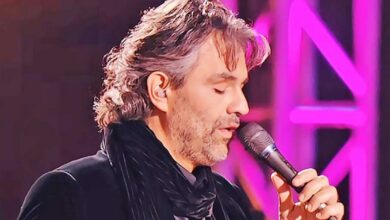Eddy Arnold And LeAnn Rimes Exhibited A Remarkable Yodeling Duel In Their “Cattle Call” Performance
Although “Cattle Call” was first introduced to audiences through Eddy Arnold’s unique interpretation, the song’s roots are deeply embedded in the traditions of American country music and cowboy culture. Arnold’s ability to encapsulate the life of a cowboy through song has helped to immortalize both the character and the traditions associated with ranch life. His vocal prowess, particularly his innovative use of yodeling, resonated with audiences and inspired a generation of country artists to explore similar motifs in their own music.
Eddy Arnold was born in 1918 in Henderson, Tennessee, and he grew up in a rural environment that greatly influenced his musical style. From a young age, he was exposed to the sounds of country music and the stories that were often told through song. His early experiences on the family farm and his fascination with the cowboy lifestyle laid the groundwork for his future successes as a country artist. Arnold’s career took off in the late 1940s, and he quickly became known for his smooth delivery and emotive storytelling, both of which are hallmarks of “Cattle Call.”
The song itself embodies the spirit of the American West, reflecting the relationship between cowboys and their cattle, as well as the challenges and rewards of this rugged lifestyle. Its lyrics convey a sense of longing and connection, using the metaphor of a cattle call to symbolize the bond between the cowboy and his herd. The image of the lone cowboy, yodeling into the vast expanse of the open range, evokes feelings of freedom and nostalgia that resonate deeply with listeners. This imagery helps to transform a simple cattle call into a rich narrative that many can relate to, regardless of their background.
Beyond Arnold and Presley, “Cattle Call” has been reinterpreted by a wide array of artists, bridging generational gaps and showcasing the song’s versatility. Each artist brings their unique flair, whether through stylistic changes, instrumentation, or vocal interpretations. This adaptability speaks to the song’s fundamental themes and its ability to connect with audiences across different musical landscapes. Various renditions have also contributed to a broader discourse within country music about heritage and innovation, often sparking new interest in traditional elements of the genre.
The song’s enduring appeal is particularly evident in its frequent appearances in films, television shows, and commercials that seek to evoke a sense of Americana or nostalgia. “Cattle Call” has served not only as an anthem for fans of country music but also as a cultural touchstone that captures the imagination of storytellers across mediums. Its blend of simplicity and depth makes it an ideal song for emotional moments, creating a sense of connection that transcends time and space.
As country music continues to evolve, “Cattle Call” remains a beloved classic, a reminder of the genre’s storied past. Artists today often look back to pioneers like Eddy Arnold when crafting their own works, recognizing the foundational role these classics play in shaping contemporary sounds. With its rich history and cultural significance, “Cattle Call” represents more than just a song; it embodies the essence of a lifestyle, a tradition, and an art form that continues to thrive.
The recording and performance of “Cattle Call” have also sparked conversations about the role of yodeling within country music. While traditionally associated with different musical genres and cultures, yodeling has found a distinctive place in country. Arnold’s incorporation of this technique elevates the emotional impact of the song and serves as a testament to his artistry. It shows how musicians can draw from a wide array of influences to craft something uniquely American while maintaining their artistic identity.
Moreover, discussions about the song often lead to explorations of cowboy culture in America, particularly its romanticized portrayal in music and media. The cowboy has become an enduring symbol of independence and ruggedness, often personifying ideals of valor and simplicity. Through songs like “Cattle Call,” these values are preserved and celebrated, reminding listeners of the hard work, challenges, and beauty involved in the ranching lifestyle.
Eddy Arnold’s legacy, highlighted by songs like “Cattle Call,” showcases the evolution of country music from its roots to its present-day complexities. As a genre that continues to adapt and embrace new influences, country music still looks to its past, relying on the artists who have paved the way. Arnold’s smooth vocals, coupled with the heartfelt narratives he encapsulated, serve not only as entertainment but as a means of cultural preservation. The story of “Cattle Call” is ultimately one of connection—between the cowboy and the cattle, between the singer and the audience, and between the past and the present.
In the grand tapestry of American music, “Cattle Call” stands out as an enduring ballad that speaks to the heart of the country experience, echoing through time with its timeless melodies and poignant messages. Its influence endures as new generations discover the song, ensuring that the legacy of both Eddy Arnold and the cowboy spirit will continue to thrive in the world of music.





